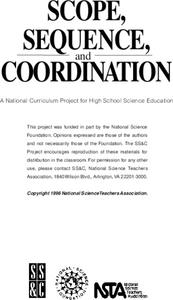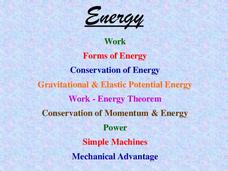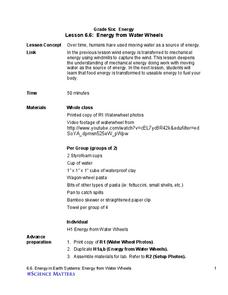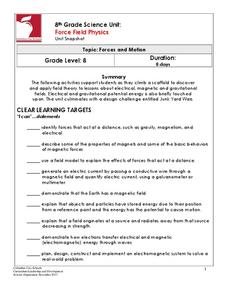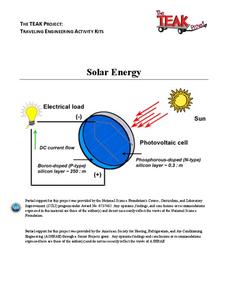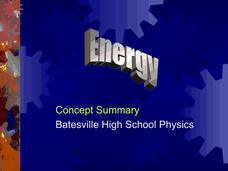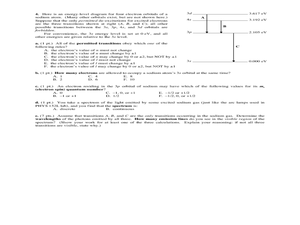Curated OER
Qualitative Examples of Conservation of Mechanical Energy
Instructions for series of six activites, a reading of scientific literature, and a choice of six assessments await you in this physics resource. Well-written plans guide you in guiding your pupils to experiment with levers, pulleys,...
Curated OER
Work and Energy
The first activity may not work for your class if you don't have access to an open area of 30 meters and two cars of different masses, but the remaining activities can be used in any physics course. They all involve the investigation of...
Urbana School District
Energy, Work, Simple Machines
The tension of the 236 strings in a grand piano exert a combined force of 20 tons on the cast iron frame. The presentation includes topics such as work, forms of energy, conservation of energy, gravitational and elastic potential energy,...
Science Matters
Energy from Water Wheels
Historians believe the first vertical water wheel was invented in Rome during the Augustan Age. The sixth lesson plan in the series of 10 has scholars experiment with designing their own water wheels. Through testing various pastas and...
Curated OER
Your Energy Out
How much activity is appropriate for elementary school youngsters? What kind of activities do they need to do? Check out the Physical Activity Guidelines for Americans. Look to see what are age-appropriate activities for each grade...
Tech Museum of Innovation
Energy at Play
Get the ball rolling and challenge your class to figure out how to make a ball move. The instruction segment is between two STEM activities devoted to doing just that. The first is simple and involves making a ball move from some force...
Science Matters
Potential and Kinetic Energy
Everything has potential energy; learning to use it is the key to understanding all types of energy. Scholars learn the difference between kinetic and potential energy. They then apply the concept to drawing examples of both types of...
Science Matters
Energy Transfer and Transformation
When you take a simple task and create an exceptionally difficult way to complete it, it is known as a Rube Goldberg machine. These machines are filled with many types of energy transfers and energy transformations. Here, pupils watch...
Curated OER
How Solar Cells Work
Students create electricity. In this solar energy lesson, students role play how photovoltaic cells change sunlight into electricity. Students discuss the experiment and create their own diagram of the model.
Serendip
How Do Biological Organisms Use Energy?
When an organism eats, how does food become energy? Young biologists follow glucose through the process of cellular respiration to the creation of ADP using a discussion-based activity. The resource also highlights conservation of mass...
Curated OER
Energy Transfer (Heat)
The pages of this resource are in landscape view and ready-made to use as slides in a presentation on energy transfer in your high school physical science course. Begin with pertinent vocabulary and finish with an explanation of the...
Columbus City Schools
Force Field Physics
Attracted class members to an activity-packed journey through the science behind the invisible forces at work all around us. From jump rope generators to junkyard wars, there's never a dull moment when eighth grade physics scholars...
Rochester Institute of Technology
Solar Energy
Warm up to the idea of solar energy. A lesson plan includes three activities that challenge scholars to apply knowledge in new ways. First, they learn to run an alarm clock without a battery by using solar energy. Next, they complete an...
Teach Engineering
Energy Basics
Power up your lessons with an energetic resource. Scholars learn about work, force, energy, and power. They consider the relationships between these quantities through hockey puck scenarios and make calculations using formulas.
Curated OER
Nutrition and Physical Education Activities in the Classroom
You can promote health and wellness using nutrition activities and lessons. With physical education activities and suggestions about snack times, you can help impvove the habits of the youngsters under your charge.
Batesville Community School Corporation
Energy in a Nutshell
Reduce the work it takes to plan a physics lesson on energy with the help of this instructional presentation. Beginning with clear explanations of kinetic and potential energy, this resource continues on to familiarize young scientists...
Curated OER
Temperature and Thermal Energy
Examine how heat can be transferred between systems by reconstructing a diagram on energy flow and solving problems on heat flow and work done.
Curated OER
Typical Numeric Questions for Physics I - Work and Energy
A total of 29 word problems furnish practice in solving for work, energy, and force. A few of the questions display diagrams to help learners visualize the systems, and all of them list five choices from which they select the correct...
American Chemical Society
The Energy of Evaporation
Do all liquids evaporate at the same rate? Young scientists observe the evaporation rate of three different liquids. They measure the time, the temperature, and the change in energy. After comparing the chemical formulas, scholars...
Curated OER
Typical Numeric Questions for Physics I - Heat
The laws of thermodynamics raise the temperature in your classroom when physics pupils complete this worksheet! They demonstrate their understanding by calculating specific heat capacity, final temperature, amount of work done, and more....
Curated OER
Physics 152 Fall 2004 Final Exam, Parts A, B, C, D
At the end of a general physics course focused on light and electricity, you can administer this exam. Concepts covered include electromagnetism, circuits, induction, light rays, lenses and mirrors, characteristics of light, electron...
Curated OER
Typical Conceptual Questions for Physics I - Heat
This worksheet would make a nifty quiz on the laws of thermodynamics. Nine multiple choice questions assess high schoolers' understanding of energy transfer, specific heat capacity, phase change, fusion, and vaporization. It is short but...
American Chemical Society
Energy and Entropy of a Stretched Rubber Band
Stephen Perry invented and patented the modern rubber band in 1845. Young scientists put his discovery to work as they use rubber bands to observe entropy and enthalpy. They determine the change in free energy to figure out if it...
Science 4 Inquiry
Introducing the Types of Energy
Young scientists explore many different types of energy including light, heat, nuclear, sound, potential, and more. They match the types of energy and identify when energy transfers from one type to another.



